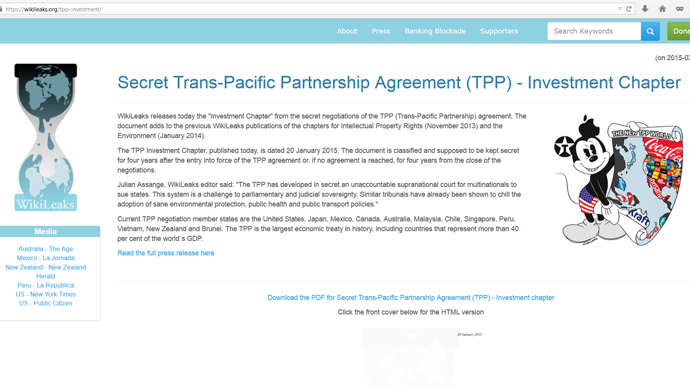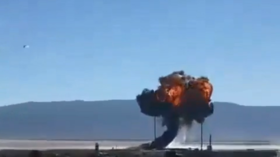Leaked TPP investment chapter: Corporations can sue states in private courts

The recently leaked chapter from the US-led Trans-Pacific Partnership Free Trade Agreement (TPP) allows firms to sue the countries they are operating in via private courts, steering clear of national jurisdictions, WikiLeaks reported.
READ MORE: Democrats to fight Obama on secret trade deal authorization
The chapter, which was completed on January 20, was verified by the Public Citizen organization that was present during secret negotiations in March, teleSUR reported.
The 55-page document discusses various mechanisms that enable companies involved in transnational corporation investment to sue the states they operate in without the involvement of national courts.
READ MORE: Anti-trade deal protesters hijack Senate TPP hearing
Companies can file a lawsuit if they believe to be losing profit or even have a lower expectation of profit due to changes in the “environmental, health or other regulatory objectives,” according to the leaked document.
Moreover, if a foreign firm feels that a new law passed by a state impacts its rights under the TPP agreement, it could challenge the country’s decision in the private arbitration system, the investor-state dispute settlement (ISDS).
Such mechanisms interfere with national sovereignty and lead to many problems, Ana Romero of the Peruvian non-governmental organization RedGE said.
“In spite of the fact that there are already similar mechanisms in the free trade agreement with the US, what is happening needs to be revised because the attraction of investors should not reinforce or expand those mechanisms that have been generation problems to the State and interfering with the national sovereignty,” Romero told teleSUR.
The leaked chapter also guarantees protection to companies from direct and indirect expropriations and amendments to the financial legislation.
READ MORE: TPP Uncovered: WikiLeaks releases draft of highly-secretive multi-national trade deal
Back in 2013, WikiLeaks revealed a draft of a highly secretive, multi-national TPP agreement long in works. It has been described as a NAFTA-like deal that is expected to encompass nations representing more than 40 percent of the world’s gross domestic product when it is finally approved.
The treaty includes 12 countries, with the US at the helm. Other countries are Australia, Brunei, Canada, Chile, Japan, Malaysia, Mexico, New Zealand, Singapore, Vietnam, and Peru.
The treaty has been heavily criticized, especially due to its lack of transparency concerning meetings between potential TPP partners, including the US and several nations in the Asia-Pacific region.
Most of the draft documents have been published solely by the anti-secrecy group WikiLeaks in an effort to disclose as much of the agreement as possible before it is adopted, but opponents of the proposal in the US have expressed concern that Congress could “fast track” the deal to expedite authorization by presenting it to the House and Senate with no amendments attached.











